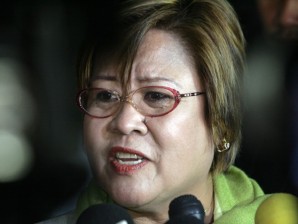De Lima pleads a 5th time with JBC
Justice Secretary Leila de Lima Friday made a final appeal to the Judicial and Bar Council (JBC) to give her a “fair chance” at being nominated to the post of Chief Justice.
De Lima sent a fifth letter to the JBC, raising new arguments as to why the JBC should reconsider her candidacy despite the disbarment cases pending against her in the Integrated Bar of the Philippines.
De Lima, who is in Iriga, Camarines Sur, for the wake and funeral of her father who died early last week, is being assisted with her JBC pleadings by a legal team from Malacañang.
In her 14-page letter, De Lima, one of the 20 nominees, raised five arguments as to why the JBC should not disqualify her.
Having no pending regular administrative or criminal cases is not among the qualifications for membership in the Supreme Court stated in the Constitution—which only requires that candidates be natural-born Filipinos, 40 years old and above, 15 years engaged in the practice of law or, judge of a lower court, and of “proven competence, integrity, probity and independence.”
The JBC would not be honoring the constitutional requirement to select one who is truly “of proven competence, integrity, probity and independence” if it disqualifies her just because somebody filed a case or cases against her, De Lima said.
A “blind and strict application” of the rules on disqualification has created an iniquitous situation in the selection process in which six incumbent Supreme Court justices are also nominees. She noted that the high court had speedily disposed of the administrative complaints against fellow candidates acting Chief Justice Antonio Carpio and Associate Justice Ma. Lourdes Sereno while it took six months to refer her case to the Integrated Bar of the Philippines.
This was unfair to “outsider” nominees like herself because it shows that the high court justices “have a definite edge in removing administrative obstacles to their candidacies,” De Lima said.
She insisted that the disbarment complaint against her was in relation to her duties as justice secretary and an alter ego of the President when she refused to obey a Supreme Court temporary restraining order preventing her from stopping former President Gloria Macapagal-Arroyo from leaving the country.
In executing the instructions of the President, alter egos like her “partake of his privilege of immunity from suit,” De Lima argued, citing a 1939 Supreme Court case, Villena v Secretary of the Interior.
De Lima insisted that the complaints against her were baseless and politically motivated or political in nature “as they seek to punish [me] for [my] acts as the alter ego of the President, not because they have the grounds to question the legality of such acts, but because they question the wisdom thereof.”
She reiterated what she had said in two earlier letters to the JBC that since there was still no determination of a prima facie case against her, she was still presumed to be innocent and that what she did as a government official enjoyed the presumption of regularity.
De Lima said the JBC should apply its rule on pending administrative or criminal suits on a case-to-case basis. She said a JBC member should base his or her choices of candidates primarily on his or her personal and professional experience “rather than on petrified rules of selection that may be outdated, not applicable to current realities, or worse, not even constitutional.”
